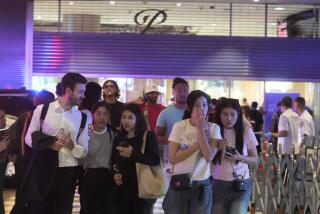Bomb blast at Greece shopping mall raises fears of extremism
- Share via
ATHENS — Two security guards were injured in a bomb blast at a shopping center a few miles north of the Greek capital Sunday, stoking new fears of escalating violence and extremism in the economically stumbling nation.
The attack on a state bank branch in a massive shopping mall came less than a week after masked men opened fire with an AK-47 and a revolver on the headquarters of the governing New Democracy party, targeting the office of its leader, Prime Minister Antonis Samaras.
No group has claimed responsibility for either attack, and authorities have refrained from linking them.
On Friday, an anonymous caller claiming ties with Greek terrorist groups warned of “escalated attacks in the coming weeks,” including “political assassinations.” The self-proclaimed terrorist, who spoke English, refused to divulge further details.
Two days later and in similar warning calls, two media groups were advised of a fresh attack 40 minutes before the remote-controlled bomb exploded at the Mall shopping center in the Maroussi suburb.
Police managed to evacuate about 200 people, but two private security guards suffered limb and back injuries from shards of glass and bomb debris. The guards were treated at a hospital and released.
Crime experts appeared increasingly certain that the latest attack, part of a two-week surge in politically tinged violence, bore the hallmarks of a new generation of revolution-minded anarchists, nihilists and middle-class troublemakers.
“That they chose to target a bank [on Sunday] or a political party a week prior, is neither new or surprising given their long-standing anti-capitalist views,” said Mary Bossi, a leading Greek terrorism expert and professor at Pireaus University. “But that they escalated their mode of action, striking at the very heart of a public area, is extremely worrying.”
“It’s a clear attack on society, the average citizen whom they see as having resigned to than having revolted against austerity and those enforcing it.”
Homegrown terrorism waned in Greece after authorities busted November 17, the country’s deadliest and most elusive terror organization, before the 2004 Athens Olympics. But numerous copycat groups and spinoffs have periodically burst into the limelight, waging mainly low-grade attacks and issuing complaints against globalization, poverty and capitalism.
The onset of Greece’s financial crisis in late 2009, together with swelling resentment against the country’s political elite, upper class and biting fiscal policies, has offered extremists fresh cause.
At this point, the sparks of their militancy have not started a fire.
“Three years into the crisis and these groups have found no appeal, sympathy or tolerance within Greek public opinion,” said Giannis Panoussis, professor of criminology at Athens University. “Whatever political support they enjoyed from radical left parties has also vanished. Even the squats they once freely occupied are being taken over by rolling police raids.”
“They realize that they have been left high and dry. That’s making them mad ... so much more dangerous — even lethal.”
The threat has put Greece’s counter-terrorism unit on high alert, according to intelligence officials. Surveillance of potential terrorism suspects has increased.
Since coming to power in June, Greece’s conservative-led coalition has vowed zero tolerance of “lawless behavior,” a move that extremists from the far left — and right — have vowed to face down.
On Sunday within hours of the shopping mall blast, Prime Minister Samaras called key national advisors for a fresh round of security talks, appealing also to the voters and political parties to shield democracy.
“This wasn’t just an attack against a building,” a government announcement said. “It was a blow to democracy, normality and attempts to restore economic growth.”
With the government trying to attract foreign capital to boost growth and jump-start the country’s ailing economy, officials fear that renewed violence could sap investor interest and damage one of Greece’s last moneymaking industries: tourism.
Carassava is a special correspondent.
More to Read
Sign up for Essential California
The most important California stories and recommendations in your inbox every morning.
You may occasionally receive promotional content from the Los Angeles Times.












